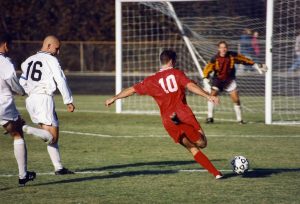“Wondering how long an Under 11 football match goes for? Let’s break it down and take a look at what to expect, especially when it comes to youth soccer games in the U.S.” Youth football is more than just a pastime it’s a crucial stepping stone in a child’s development, fostering teamwork, discipline, and physical fitness.
For parents, coaches, and young players, understanding the structure of matches is key to preparation and enjoyment. One of the most common questions asked is: How long an Under 11 football match lasts?
In this comprehensive guide, we’ll dive deep into the timing of Under 11 (U11) matches, explore variations across countries, break down associated rules, and provide helpful tips for players, coaches, and parents alike.
How Long Is an Under 11 Football Match?
Standard Match Duration
According to The Football Association (The FA) in England, Under 11 football matches typically last 60 minutes in total. This is divided into:
- Two halves of 30 minutes each
- With a half-time interval of up to 10 minutes
- 🏆 Note: This format may vary depending on the country, competition level, or league regulations.
Quick Overview:
| Component | Duration |
|---|---|
| First Half | 30 minutes |
| Half-Time | Up to 10 minutes |
| Second Half | 30 minutes |
| Total | 60 minutes |
Why the Match Length Is Different from Adult Football
Unlike adult football (which lasts 90 minutes), youth matches are shortened to align with the physical and cognitive development of younger players.
Reasons for shorter match durations include:
- Reduced risk of fatigue or injury
- Better concentration spans
- More engaging and enjoyable experience
- Increased touch time with smaller-sided games
Variations in Match Length by Country and League
While the general duration is standardized in many regions, it can vary depending on the governing body.
England (The FA Guidelines)
U11s typically play 9-a-side matches
- Game length: 2 x 30-minute halves
- Max playing time per day: 80 minutes
- Pitch size: 70 x 45 yards (approximate)
- Ball size: Size 4
United States (US Youth Soccer)
- Match duration: 2 x 30 minutes
- Players: 9-a-side
- Half-time break: 5–10 minutes
- Ball size: Size 4
Australia (Football Australia Mini Roos)
- Match duration: 2 x 25-minute halves
- Players: 9-a-side
- Half-time break: 5 minutes
- Ball size: Size 4
⚠️ Always check with your local football association or club as match lengths may differ slightly based on climate, league rules, or special events.
Format of U11 Football Matches
9-a-Side Game Format
Under 11 football is usually played as a 9v9 format on a smaller pitch than adult games. This encourages more involvement from every player, improves skill development, and keeps the game manageable.
Key Features of the 9v9 Format:
- Pitch Size: ~70 x 45 yards
- Goal Size: 16 x 7 feet (varies)
- Ball: Size 4
- Offside Rule: Usually applies
- Rolling substitutions allowed
- Coaches often referee or support match officials
Common FAQs About U11 Football Match Duration
1. Can the match be shorter than 60 minutes?
Yes. Especially in local friendlies, training games, or during poor weather, matches may be shortened to two 25-minute halves or as agreed by both teams.
2. Can kids play multiple games in a day?
Yes, but governing bodies usually limit total playtime to 80 minutes per day. Tournament matches often consist of shorter games.
3. Are there time-outs?
No formal time-outs exist in standard U11 football, but referees may pause the game for injuries or safety reasons.
4. What happens if the match ends in a draw?
In league play, a draw is typically allowed. In cup competitions, a draw might lead to:
- Extra time (2 x 5 minutes)
- Penalty shootouts (especially in finals)
Actionable Tips for Parents and Coaches
⚽ Before the Match
- Confirm the match schedule and duration with the coach or organiser.
- Ensure your child gets adequate rest and hydration before the game.
- Pack essentials: water, healthy snacks, shin guards, and boots.
🧠 During the Match
- Encourage fair play and sportsmanship from the sidelines.
- Focus on enjoyment, not just the result.
- Support all players, not just your child.
💬 After the Match
- Give positive feedback: highlight effort, not just goals or wins.
- Discuss what your child learned and enjoyed most.
- Allow time for recovery, especially after tournaments.
Evolution of Youth Match Formats
Youth football has undergone significant changes in recent years to promote better player development. Traditional full-sized formats have been replaced with small-sided games, such as:
- 5-a-side for U7–U8
- 7-a-side for U9–U10
- 9-a-side for U11–U12
This format ensures:
- More touches on the ball
- Better spatial awareness
- Improved technical skills
A gradual progression toward the 11-a-side format used in senior matches
Real-World Example: How a Club Runs U11 Matches
Let’s take a look at Eastwood Juniors FC, a local grassroots football club in the UK.
- Weekly Matches: Played on Sundays at 10 AM
- Duration: 2 x 30 minutes with a 10-minute break
- Coaches: One per team + rotating referee from the club
- Focus: Skill building, confidence, and teamwork
- Parental Role: Encouraged to cheer but not coach
Their feedback? “Keeping matches to 60 minutes keeps the kids sharp and energetic throughout. Anything longer and we’d lose their focus.”
Visual Recommendations (Include for Better Engagement)
- Infographic: “Breakdown of U11 Football Match Duration by Country”
- Image: “Standard 9-a-side Football Pitch Layout” (with dimensions)
- Chart: “Comparison of Youth Football Match Durations (U7 to U12)”
Conclusion
So, how long does an Under 11 football match last? In most cases, it’s 60 minutes split into two 30-minute halves perfectly tailored for the physical and mental development of children aged 10–11. Whether you’re a coach, parent, or new player, understanding the structure and purpose of youth match formats helps everyone enjoy the game more fully.
By staying informed and supportive, you’re helping to nurture not just the next generation of footballers but confident, capable young individuals.


